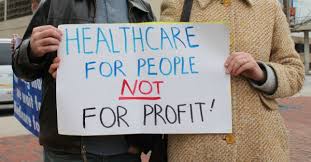
Here are short takes on three important stories that have gotten little attention in the mainstream media. Each provides a quick summary of the story, a hint as to why it’s important, and a link to more information. They range from profitable corporations that pay their executives more than they pay in federal taxes to corporate profit enhancement through shrinkflation to over a billion dollars in fraud enabled by Walmart.
STORY #1: A recent study found that for the period from 2018 to 2022 thirty-five profitable U.S. corporations paid their five top executives more than they paid in federal taxes. They include Tesla, T-Mobile, Netflix, Ford, Darden Restaurants, and MetLife. An additional 29 corporations paid their executives more than they paid in taxes in at least two or those five years. [1] Over this 5-year period, these 64 corporations had profits of $657 billion, paid their executives over $15 billion, and paid only $18.4 billion in federal taxes, just 2.8% of their profits. For decades, corporate profits and executive pay have been rising dramatically, while the amount corporations pay in taxes has been steadily declining.
The effective U.S. corporate tax rate has fallen from roughly 50% in the 1950s to 17% in 2022. Dodging taxes whenever possible and lobbying to reduce taxes are easy ways for corporate executives to increase profits and returns to themselves and shareholders. The low taxes paid by big corporations mean that other taxpayers have to pay more or get less in public services. [2]
A Tax Excessive CEO Pay Act has been introduced in Congress and would increase taxes on corporations where CEO pay is over 50 times that of their typical employee. The Act would gradually increase a corporation’s tax rate if the ratio of its CEO’s pay to that of its median worker is over 50 with up to a five-percentage-point increase in the tax rate if the ratio is over 500. The typical CEO-to-worker pay ratio today is about 350. For example, at McDonald’s the ratio is 1,224 and under this legislation its taxes last year would have been increased by $92 million. [3] I urge you to contact your U.S. Representative and Senators to ask them to support the Tax Excessive CEO Pay Act. You can find contact information for your US Representative at http://www.house.gov/representatives/find/ and for your US Senators at http://www.senate.gov/general/contact_information/senators_cfm.cfm.
Exorbitant CEO pay and high corporate profits are key factors leading to the growing numbers and wealth of billionaires. Forbes magazine just released its updated worldwide billionaires list. The number of individuals with wealth of over $1 billion grew by 141 last year to 2,781. Together, they own combined wealth of over $14 trillion. Fourteen of them have wealth of over $100 billion. Many of them oppose fair taxation of themselves and their businesses, and many of them also oppose fair treatment of workers by opposing unionization and imposing low pay and poor working conditions. Elon Musk of Tesla and Jeff Bezos of Amazon are classic examples. [4]
STORY #2: As if price gouging under the guise of “inflation” hadn’t boosted profits enough, corporations have also been engaging in another form of profit maximization at consumers’ expense: shrinkflation. First, corporations increased prices using their monopolistic power, blaming it on Covid-related “inflation” – but they’re not dropping prices now even though all the rationales for this “inflation” have dissipated. Now, they’re shrinking the amount of food or goods, such as snacks and paper products, in packages without reducing prices. For example, paper towels and toilet paper are 34.9% more expensive than in January 2019 and almost a third of that increase is due to shrinkage in the amount of product in packages. As a result, corporate profits are skyrocketing. [5] [6]
The Biden administration is attacking the monopoly power that lets corporations engage in consumer price gouging. It’s suing meat processors for price fixing and it’s blocking the merger of two huge grocery store chains, Kroger and Albertson’s. Biden and members of Congress are promoting the Shrinkflation Protection Act and the Price Gouging Protection Act. Both bills would empower the Federal Trade Commission to protect consumers from these unfair and deceptive corporate practices. I encourage you to contact President Biden and your Members of Congress to let them know you support these bills.
STORY #3: Since 1999, Walmart has been expanding its business into financial services. However, over the last decade, its gift card and money transfer services have enabled over $1 billion in fraud. Walmart has pushed back against efforts to require improvements in its oversight and fraud prevention, has failed to perform necessary employee training, and has failed to live up to promises made to regulators and business partners to prevent fraud.
Walmart has a financial incentive not to crack down on this fraud because it earns fees on each transaction – every Walmart gift card used, every sale of another company’s gift card, and every money transfer. These activities produce hundreds of millions of dollars in annual profits. [7]
In 2017, for example, the New York and Pennsylvania attorneys general investigated Walmart for profiting off gift card fraud. As a result, Walmart promised to ban or restrict the purchase of other companies’ gift cards with Walmart gift cards, a favorite scheme of scammers. However, it let the practice continue until 2022, even though it knew millions of dollars of fraud were occurring. At least 28 people have been convicted in state or federal courts of stealing tens of millions of dollars through gift card transactions at Walmart stores.
Walmart has ignored repeated warnings that up to 75% of the money transfers at some of its stores were fraudulent. Its money transfer partner, MoneyGram, reported at one point that of all the partners it worked with nationally Walmart stores were all of its top 20 fraud locations. In one week in March 2017, there were 610 complaints of money transfer fraud at Walmart, far more than anywhere else. (CVS was second with 47 complaints.) In 2022, the Federal Trade Commission sued Walmart for ignoring fraud in its money transfer service while it made millions in fees. In public statements, Walmart touts its anti-fraud efforts while in private filings in court cases it claims it has “no responsibility to protect against the criminal conduct of third parties.”
Despite these problems, Walmart continues to expand its financial services.
[1] Institute for Policy Studies and Americans for Tax Fairness, March 2024, “More for them, less of us,” (https://ips-dc.org/report-corporations-that-pay-their-executives-more-than-uncle-sam/)
[2] Johnson, J., 3/13/24, “Report exposes US corporations that pay their execs more than they pay in taxes,” Common Dreams (https://www.commondreams.org/news/ceo-pay-taxes)
[3] Johnson, J., 6/22/24, “Progressive lawmakers unveil bill to attack ‘disease’ of corporate greed,” Common Dreams (https://www.commondreams.org/news/sanders-corporate-tax)
[4] Conley, J., 4/2/24, “Forbes billionaires list shows ‘utterly unconscionable’ wealth growth of world’s richest,” Common Dreams (https://www.commondreams.org/news/forbes-list-billionaires)
[5] Reich, R., 3/30/24, “Record corporate profits from your thinning wallet,” Robert Reich’s daily blog (https://robertreich.substack.com/p/record-corporate-profits-coming-from)
[6] McCloskey, E., 2/22/24, “You’re not imagining it,” Patriotic Millionaires (https://patrioticmillionaires.org/2024/02/22/youre-not-imagining-it/)
[7] Silverman, C., & Elkind, P., 1/17/24, “How Walmart’s financial services became a fraud magnet,” ProPublica (https://www.propublica.org/article/walmart-financial-services-became-fraud-magnet-gift-cards-money-laundering)




